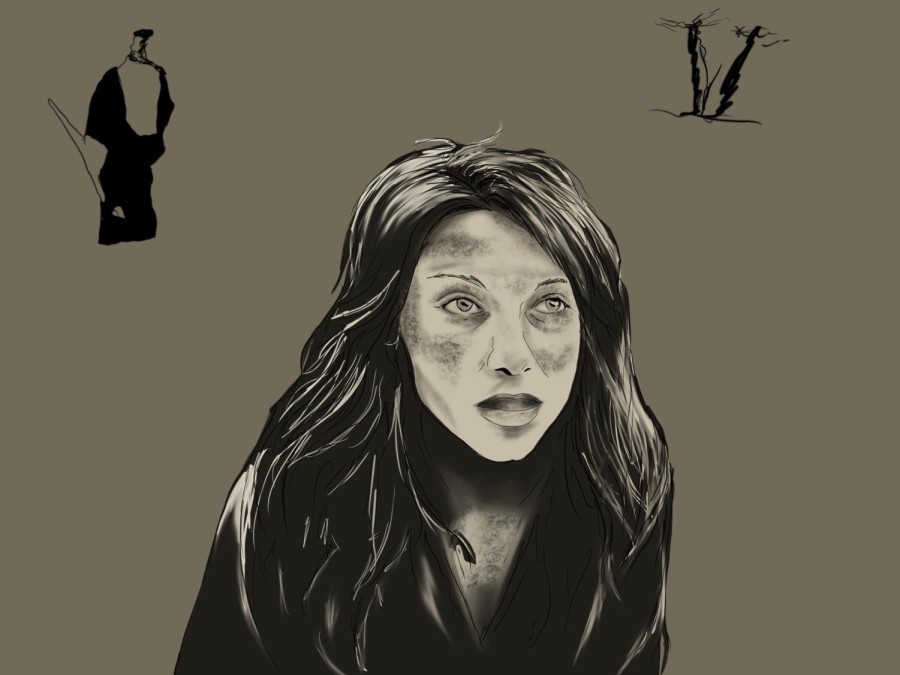Review: ‘You Won’t Be Alone’ meditates on the simultaneous universality and individuality of the human experience
Goran Stolevski’s “You Won’t Be Alone” (2022), a fantasy film set in rural 19th century Macedonia, tells the story of a witch who learns to navigate the world in a human body.
“You Won’t Be Alone” marks Goran Stolevski’s directorial debut. It premiered at the 2022 Sundance Film Festival. (Staff Illustration by Aaliya Luthra)
April 13, 2022
Content warning: This article mentions abuse and sexual assault.
Filmmaking and movie-watching have evolved into collective processes and experiences. When it comes to international cinema in particular, film acts as a unifying language that ties together cultures, experiences and, often, acts of political subversion. Directed by Goran Stolevski, “You Won’t Be Alone” takes place in rural 19th century Macedonia, where an impoverished group of tight-knit villagers spend their days working the land while brutally enforcing strict gender roles.
The film follows Nevena (Sara Klimoska), a young girl who’s been kept in an isolated cave for the duration of her life. This is a protective effort of her mother, who promised her to the famed Old Maid Maria (Anamaria Marinca) when she was a baby. Maria, a witch, is a shape-shifting vampire the villagers refer to as a “wolf-eateress,” one of multiple feared beings known to steal infants and drain livestock of their blood. Years later — after being taken and transformed by Maria into a witch herself — Nevena develops an aversion to her harsh, violent ways and ventures into a human village.
Though branded as an antagonist, Maria was human before she was a witch, her “old maid” epithet being a consequence of her failure to find a husband. We learn through flashbacks that all she ever wanted was to be a mother, but she was grievously mistreated by other villagers as a result of her endeavors.
In “You Won’t Be Alone,” women are villainized for underperforming in the roles they are forced into. It’s no wonder, then, that Maria’s fixation on Nevena often toes the line between obsession and pure hatred — a child is all she was ever taught to desire, and it led to her ostracization from society.
While Nevena discovers that by killing any human or animal and shoving their organs into a cavity in her chest she is able to take their shape, she learns how lonely it is to be human. Particularly in this film’s setting, there is little room for individuality, and Nevena’s otherness is constantly emphasized by her inability to conform socially and the sharp, black nails that characterize her as a witch.
Though viewers feel a sense of connection to Nevena as a result of Klimoska’s hypnotic, raspy narration, the narrated passages are all thoughts and feelings she is incapable of articulating and expressing to the outside world. Her first encounter with Maria when Nevena was a newborn left her unable to speak, the witch piercing her throat with her inhuman, talon-like nails as a down payment of sorts. Having already been deprived of speech, Nevena is completely alone in her limited perception of the world, leaving her to balance innate curiosity with the unfamiliar, mundane duties of the human whose shape she’s taken on.
Despite her narrow view of the world and her inability to communicate verbally, Nevena rapidly becomes aware of the inequality between genders and the manipulative nature of men, proving much more perceptive on the matter than anybody else. Instead of being slowly and unknowingly eased into the role of the oppressed and abused woman, Nevena is abruptly forced into it. The first body she commandeers — a young wife and new mother, brilliantly portrayed by Noomi Rapace — is victim to her husband’s verbal and physical abuse, which only escalates once Nevena takes over and the village believes she has lost her mind.
While Nevena recognizes that what men want is her tears, or any other sort of reaction that corroborates their feelings of superiority, she refuses to give it to them, choosing instead to use her newfound human body to explore her surroundings and form relationships with other women.
Later in the film, Nevena takes the form of a young man (Carloto Cotta), and it is in his body where she learns that a man’s experience of the world is characterized by pleasure, whereas a woman’s is characterized primarily by constant pain. Stolevski most distinctly juxtaposes these experiences through sex, which Nevena had only previously encountered as a form of assault.
Nevena’s mannerisms and behaviors also receive very different responses from the villagers, men and women alike. While she often exposes herself, mimics others and otherwise deviates from societal norms — regardless of the body she is occupying — as a man, she is met with pity and treated kindly in her supposed sickness.
Similarly to how Nevena can truly only understand these different interpretations of the world firsthand, this is a movie meant to be watched alone. The title itself is ironic, suggesting a general sense of human camaraderie while simultaneously demanding a viewing experience that is introspective and reflective. Despite the film’s emphasis on tangibility and the physical experiences that constitute humanity, it doesn’t try to generalize the human condition, nor does it reduce it to solely these experiences.
Of course, this isn’t to say that a film like “You Won’t Be Alone” doesn’t deliver on its title by reassuring viewers that their suffering, trauma and hardship isn’t theirs alone. Instead, it emphasizes the idea that their perception of the world truly is theirs alone. You will only ever spend the entire duration of your life with yourself, and nobody will ever have the same combination of experiences that you do.
“You Won’t Be Alone” recognizes the distinct, societal mistreatment of women and how it alters their relationships to each other and the world around them. Despite a history of anti-feminism and women’s oppression — marital rape, which Nevena becomes a victim of, wasn’t outlawed in Macedonia until 1996 — this particular version of womanhood isn’t unique to Macedonia. “You Won’t Be Alone” could have taken place in nearly any country, with any language, and the message would’ve remained the same: The way women have historically been treated is one of the few universal human experiences rooted in specific, yet widespread, cultural phenomena.
Between the obvious thematic similarities and seductive, haunting cinematography, “You Won’t Be Alone” is a must-watch for fans of Robert Eggers’ “The Witch” (2015). Though both are labeled as horror films, the graphic gore riddled throughout both only serves as a reminder of life’s temporality and distinct physicality.
“You Won’t Be Alone” is a dreamy, meditative and poetic journey of self-discovery. It reflects on the villainization of women and the “horrid wretchedness” of the world, as it is described at the end of the film. Despite this wretchedness, it is the simplest moments, those that are most beautifully and intensely human, that make life worth enduring.
Contact Lorena Campes at [email protected].




























































































































































